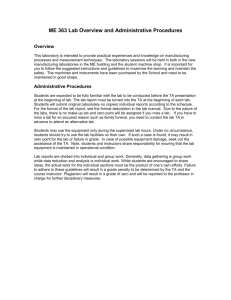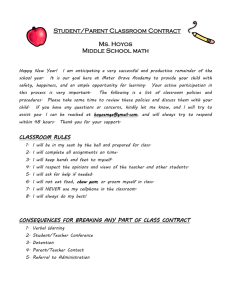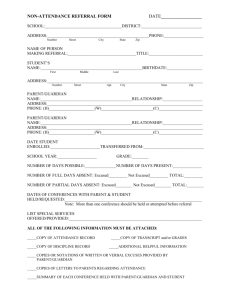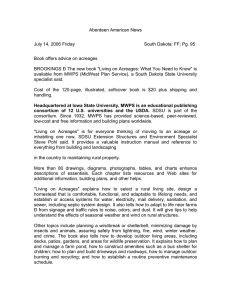English 1010 Syllabus - Taylorsville-Parrish
advertisement
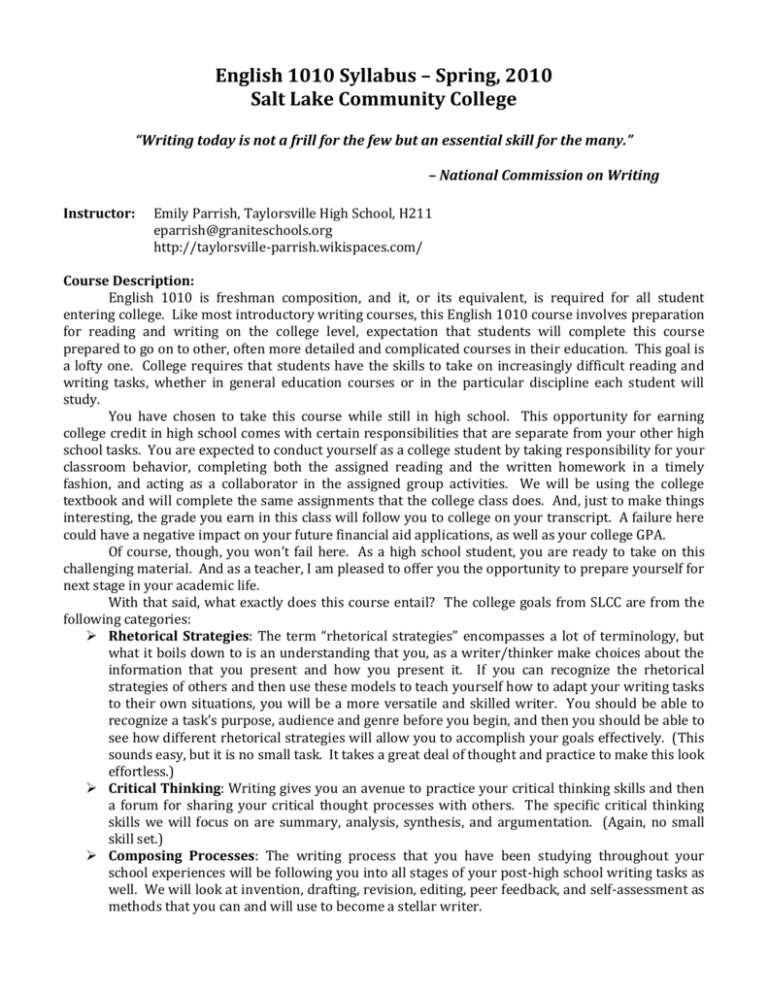
English 1010 Syllabus – Spring, 2010 Salt Lake Community College “Writing today is not a frill for the few but an essential skill for the many.” – National Commission on Writing Instructor: Emily Parrish, Taylorsville High School, H211 eparrish@graniteschools.org http://taylorsville-parrish.wikispaces.com/ Course Description: English 1010 is freshman composition, and it, or its equivalent, is required for all student entering college. Like most introductory writing courses, this English 1010 course involves preparation for reading and writing on the college level, expectation that students will complete this course prepared to go on to other, often more detailed and complicated courses in their education. This goal is a lofty one. College requires that students have the skills to take on increasingly difficult reading and writing tasks, whether in general education courses or in the particular discipline each student will study. You have chosen to take this course while still in high school. This opportunity for earning college credit in high school comes with certain responsibilities that are separate from your other high school tasks. You are expected to conduct yourself as a college student by taking responsibility for your classroom behavior, completing both the assigned reading and the written homework in a timely fashion, and acting as a collaborator in the assigned group activities. We will be using the college textbook and will complete the same assignments that the college class does. And, just to make things interesting, the grade you earn in this class will follow you to college on your transcript. A failure here could have a negative impact on your future financial aid applications, as well as your college GPA. Of course, though, you won’t fail here. As a high school student, you are ready to take on this challenging material. And as a teacher, I am pleased to offer you the opportunity to prepare yourself for next stage in your academic life. With that said, what exactly does this course entail? The college goals from SLCC are from the following categories: Rhetorical Strategies: The term “rhetorical strategies” encompasses a lot of terminology, but what it boils down to is an understanding that you, as a writer/thinker make choices about the information that you present and how you present it. If you can recognize the rhetorical strategies of others and then use these models to teach yourself how to adapt your writing tasks to their own situations, you will be a more versatile and skilled writer. You should be able to recognize a task’s purpose, audience and genre before you begin, and then you should be able to see how different rhetorical strategies will allow you to accomplish your goals effectively. (This sounds easy, but it is no small task. It takes a great deal of thought and practice to make this look effortless.) Critical Thinking: Writing gives you an avenue to practice your critical thinking skills and then a forum for sharing your critical thought processes with others. The specific critical thinking skills we will focus on are summary, analysis, synthesis, and argumentation. (Again, no small skill set.) Composing Processes: The writing process that you have been studying throughout your school experiences will be following you into all stages of your post-high school writing tasks as well. We will look at invention, drafting, revision, editing, peer feedback, and self-assessment as methods that you can and will use to become a stellar writer. Conventions of Writing: Your greatest ideas cannot be understood unless you put them in comprehensible, grammatical format for your audience. As you enter the college world, you also have to consider the needs of research writing—citing multiple sources, documentation methods, attribution—and follow the conventions of this type of prose. We will be adding this study to our list. Thus, as you can see, this class will be ambitious. At the end, you will be able to assess an assigned writing task, complete the steps in a writing process, produce well-written and thoughtful prose, assess your own meta-cognitive process, and leap tall buildings in a single bound (super-hero outfit optional). Text and Materials: Writing: A Guide for College and Beyond, Second Edition, by Lester Faigley Writer’s notebook for class notes, vocabulary study, etc. A large binder for your senior portfolio Computer access The Wiki In an effort to be a friend to the planet, I am on a crusade to cut my paper consumption here at the school by 50% this year. Instead of handing out pages of paper that you won’t keep, I am putting this information on my Wiki space (http://taylorsville-parrish.wikispaces.com/). On the Wiki, you will find a copy of this disclosure, the AP reading list, the MLA format, assignments, instructions, helpful study guides, and anything else that I think will enrich your life and make you want to dance with glee. If you don’t have internet at home, you can always access this information here at school in the Media Center before and after school. As a part of this, you need to keep a notebook of vocabulary as well as lots of helpful notes on grammar and writing. In college, you will be expected to take notes in every class every day, and I am always surprised that students don’t assume that they’ll be doing that in a college class here. So, look at this as my way of getting you started on a good habit. You should have a spiral-bound notebook or some other reliable method of keeping and organizing the notes for this class, and you should just assume that everything we do in class should be kept in your notebook. (Please don’t ask, “Should we write this down?” Yes. You should.) Grades: Your grade will be earned as follows: 40% — Notebook, class work, and responses 35% — Essays and MWPs (Major Writing Projects) 25% — Participation in class and group projects Grading Scale: A AB+ B BC+ = = = = = = 94 90 87 83 80 77 - 100% - 93% - 89% - 86% - 82% - 79% C = C- = D+ = D = D- = F = 73 - 76% 70 - 72% 67 - 69% 63 - 66% 60 - 62% Below 60% Class Rules: (In the order of importance.) Please do NOT bring food or drinks into the classroom. If you have a bowl of cereal that you are trying to finish, you will have to eat it in the hall. If you are late for class, you will be marked tardy, even if you are in the hallway, clearly visible, wolfing down your Captain Crunch as fast as your little teeth will allow. (I know that this sounds crazy, but it happens more than you might know.) You may bring water, as long as it is in a closed container and won’t make a mess on the desks, carpet, or your papers. No cell phones, hand-held organizers, I-Pods, MP-3 players, CD players, earphones, headphones, etc. etc. allowed in the classroom. (Even if you think class is over and you can just jam for a minute or two...you can’t.) If you want to take the hall pass, you must surrender your cell phone. I will not be the patsy who allows you to go out into the hall to talk on the phone as though something else is more interesting than my class. (As if!) Be prepared for class. I don’t like to lend out my hall pass for someone who forgot to bring an assignment or book to class. You’re in a college class, for pete’s sake. Come to class prepared! Be respectful when others are speaking in class. (This is not really a problem, thus far. I’m assuming that you will want to listen to others as you would want them to listen to you.) Work is due at the beginning of the class period listed. After this, all late work incurs a late penalty. I do not chew gum, but I have no real objection to gum in my class as long as it is invisible, inaudible, and inodorous to me. (Please don’t pop it. And don’t put it under the desks or drop it on the floor. And if I ask you to get rid of it, don’t swallow it. You know that it sits in your stomach for seven years, right?) Attendance: Attendance is required for success in this course. Take this opportunity to really prepare yourself for your post-high school life. The habits that you establish now will follow you to college where they will either help you to be successful or they will hinder your progress. Missing class means that you miss discussion, group activities, and essential information about deadlines, assignments, and up-coming events. Moreover, the class misses you. You are a member of a group, and your opinions and ideas are important to us…Now, with that said, what happens if you do miss class? You earn participation points for being in class every day. If you miss class, you must find a way to verify to me that this absence was excused, and I will excuse the points. But there is no way to earn them back if you aren’t in class. I only enter the participation points once per day, when I do attendance. If your absence is excused, but you have not turned in the documentation to the attendance office, I have no way of knowing that it was excused; it won’t show up on Gradebook. Even if you turn in the note the next day, I won’t know, and I don’t have time to go back and check on all those previous days. It is up to you to prove that the absence is excused with a printout from the attendance office. You are responsible for keeping track of what we are doing in class, even if you aren’t here. Find a study buddy; buy her or him a donut. Agree to help each other. That way, if you miss a fascinating discussion, you can hear about it from your buddy. If you miss class for a school excused absence, you are still required to make up any in-class work, any assignments due, or anything else that happens. Again, you will need a study buddy to help you with the notes or information from class. If you have an assignment due on a day when you have an excused absence, you have an extra day to get it turned in. Please put a note at the top that tells me if the absence was excused. Otherwise, I’ll automatically deduct points. (Please don’t think that if I signed a school note for a school-excused absence that I will remember it. For a moment, please contemplate the sheer volume of paperwork that comes across my desk in the course of a day, a week, a month, a term…and remember that if you have an explanation for things or the absence has not been put into the computer as excused, I probably will not remember it. Write it down and either attach it to your assignment or put it on a lovely Post-It near my computer.) However, if you are going to be out of school on the day that a Major Writing Project is due, you MUST find a way to get that assignment to me before 2:30 P.M. I WILL NOT ACCEPT MWPs LATE!!! You should probably also be aware of this: I try to update the grades in the computer as often as I can. But when you turn in work that is not with the class set, I quite often do not get to sorting through that “late” pile until I absolutely have to, which is usually the day that grades are due. If you are one of those people who monitors your grade obsessively, you will see the “M” on the grade sheet until the late work has been recorded, often the last day of the term. (Of course, if you are the type who obsessively monitors your grade, you probably aren’t the type to turn in late work.) Please do not keep nagging me about taking care of the late work. I’ll get to it when I get to it. If you want your grade to be updated regularly, don’t turn anything in late! Punctuality: Being tardy is a great way to lose participation points. You will lose five of your twenty daily points for being late. Besides, it is just bad manners to come in late. You miss important information or instructions, and you interrupt things. Tardiness affects your grade through the participation points and it affects your citizenship grade. I follow Granite School District’s policy on tardiness and citizenship. The Attendance Bump and a Participation Bonus: I really like good attendance and punctuality, and I’ll reward it accordingly. If you have not missed more than two days (both excused) during the term and you have NO tardies, I will bump your grade one level (from a B to a B+, for example). I also reward whole classes who get to class on time. If every student is in her or his seat when the bell rings, I will give the class an extra ten points of participation points. So, get to class on time and encourage your classmates to get there on time as well. Academic Integrity: I hate to even have to mention this problem in my class, because I want to believe that everyone is in school to gain an education, but every year, I hear more and more stories about how hard students work at cheating, much harder than they would have to work if they just did the assignments. So, I must acknowledge that students will be tempted and students will cheat. Please don’t let it be you, okay? To try and keep this problem from my classroom, I will follow the following policy. First of all, if I see you cheating on a test or quiz in class, I will be so disappointed. I will discuss my suspicions with you before giving you the big 0 on the test. If it happens a second time, I will be even more disappointed, and I’ll have to make a call home. If I find that you have plagiarized a paper or purchased a paper from some paper-writing organization on the web, or borrowed a paper from another writer, I’ll be disappointed and you’ll get a big 0 on a major assignment. And I’ll be mad because I had to grade work from someone who wasn’t even you. (Believe it or not, I can usually tell the difference between your writing and the writing of someone else who is writing in your stead.) I’m always surprised when students come to me and tell me that someone else in the class or one of their friends is cheating on an assignment or quiz, and you might be surprised to find out that your peers are really concerned about others getting away with doing such shoddy work. I usually find out that someone has cheated, and I’m always disappointed, and even if you get away with it, the guilt will follow you FOR THE REST OF YOUR LIFE. (I know this. I feel tremendous guilt for every teacher I ever disappointed.) Late Work: I accept late work. I’ve tried to discourage it because I think it sets up sloppy academic habits, but let’s face it, someone always has a good excuse, so I’ve decided that I will take the work. But...it will cost you up to 25% for the assignment. That’s a real bummer, though, because you will have to do the same amount of work but you won’t get full credit. The deadline for turning in for full credit is 2:30 on the due date, so if you aren’t prepared or are going to miss class on a day that an assignment is due, you will need to find someone to bring it to me, bring it in yourself early, or find a carrier pigeon to get it through my window by 2:30 (if you want it to receive full credit, that is). There is one IMPORTANT EXCEPTION to the late work policy. In this class, we have four major projects (just so you won’t forget how important they are, I call them the “Major Writing Projects” or MWPs…just trying to be helpful). THESE MAJOR WRITING PROJECTS—INCLUDING ALL THE PROCESS WORK THAT WILL ACCOMPANY THE FINAL ESSAY—WILL NOT BE ACCEPTED LATE!! If you are not in school on the day an MWP is due, and you have a valid reason for not being in school or a parent/guardian excuse, you need to find a way to get that portfolio to me by 2:30 P.M. You can leave it in the school office, you can send it with a friend, or if you have a really strong carrier pigeon, you can send it straight to my window. But it must be in my hands on the due date or it will be a “0.” Please don’t test me on this. I have had A level students fall to C level, and C level students have jeopardized their graduation by missing this deadline. Office Hours: I am usually available for discussion or questions after school for about 30 minutes. I am also a fairly early riser, so before school is a good time to consult with me. This year, we have a Monday morning late start time which may also be available for make-up work. Because I am used to Tuesdays as a quiz make-up day, I will be here after school on Tuesdays to give vocabulary quizzes. (You can also stop by to talk about that bribe you’ve been contemplating…) A Final Message to Parents/Guardians of My Students: First of all, thanks for reading my disclosure. You won’t believe the number of students who tell me that no parent ever reads disclosure statements. Of course, they also tell me that they don’t read them either, so I can only assume that most disclosures are not that entertaining. I look forward to meeting with you at Parent/Teacher Conferences. Teaching your student is the best part of my job, and I’m looking forward to getting to know her or him. I want you to know that I think that you and I are partners in this educational endeavor that your student is undertaking this year, and I hope that we can be cooperative. Your student has taken on college course work while in high school, and he or she is to be commended for this, as are you for your encouragement. Of course, this all comes with greater responsibility for all of us: student, parent/guardian, and teacher. Since this is a college-level class, I always assume that parents will want students to handle the issues that may come up throughout the year. I think it is good practice for them. However, you may want to contact me, or I may want to get in touch with you. So I’m asking that all parents send me an email acknowledging the disclosure. In this way, I can set up an address book in my email so that I can contact you easily. In your email, please include your and your student’s full name and what class your student is in. (Email return addresses don’t always match the student names on my list.) As a bonus, when I get this communiqué, I’ll give your student 25 bonus points as a gift from you. If you do not have an email account, or you wish to communicate with me in another manner, please send an acknowledgement on a note with the preferred method of communication such as a cell phone or daytime phone number. In addition to my email, which I try to read daily, I can be reached through written communication through your student, through the school’s phone system, or by signal fire. (That last one probably won’t work so well, though, because I don’t get outside much.) I usually read my email first thing in the morning, and I will respond promptly to all questions and concerns if I can. Assignments in English 1010 Fab Vocab: Each class starts with a little vocabulary—words that qualify as college-level and are quite fun to use to stump friends and family at parties. We will learn five words per day, and every time we reach 25, we will have a quiz. At the end of each term, we will also have a notebook check, and you will receive one point for each word, definition, and sentence. These are easy points to earn if you keep track of your fab vocab daily at the beginning of class. MWPs: The MWPs are three essays and a visual rhetoric project. Each MWP will be turned in with a final draft and a self-reflection, as well as all the process work that we have done along the way. Some of this process work will have been checked off in class with a stamp. The only way to get that stamp (and full credit for the assignment) is to have the work stamped off in class. That means, of course, that you have to be in class to do that. Often one part of the writing process is due because you have to share it with peers or show that you are ready to proceed with the next part of the assignment. If you don’t have that part of the work done in class, you will not get full credit. Senior Portfolio: As with all English classes, I require the portfolio. I grade on four categories: creativity, scope, accessibility, and reflection. You should have a sizable portfolio by now, the second half of your senior year, and showing it off will be a party for us all. Peer-Editing: A major part of learning to write on the college level is learning to edit your own paper with peers and then editing papers for others. Because of this, I place a high priority on peer-editing days in class. For each MWP, we have two classes of peer review, and being in class on those days, prepared with your own papers, is a requirement of this class. For this, you will earn 50 points. Unfortunately, I don’t have control of time (I’m waiting for it, though), and I can’t turn back the clock to re-create that class editing group for you if you miss, even if it is excused. You can’t send your paper to be edited by others; that wouldn’t be an effective edit. And if you send your paper to be edited by others, you are not there to offer your own editing advice for them. Thus, the ONLY way to earn those 50 points is to be in class, prepared, for the editing group.
